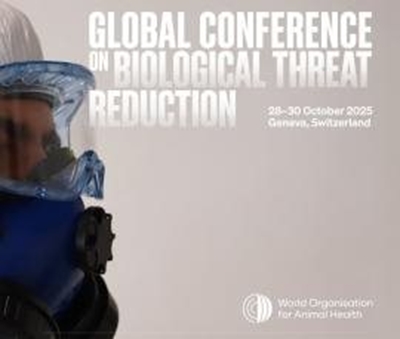AGRICULTURE NEWS - Agriculture Minister John Steenhuisen has reaffirmed South Africa’s commitment to global biosecurity, animal health and food security, highlighting the country’s proactive measures to reduce biological threats through a One Health approach.
Addressing the Global Threat Reduction Conference of the World Organisation for Animal Health (WOAH) in Geneva, Switzerland, on Tuesday, Steenhuisen said South Africa recognises that biological threats, whether naturally occurring, accidental, or deliberate, pose a serious challenge to both national and global health security.
“Our approach to biological threat reduction is anchored in the One Health values, which acknowledge that the health of people, animals and the environment are inseparably linked,” Steenhuisen said.
The Minister outlined South Africa’s national strategy, which focuses on early detection, prevention, and rapid response to biological risks, supported by strong governance structures, evidence-based policies, and sustained collaboration among national, regional, and international partners.
Through these efforts, he said the country aims not only to safeguard animal and public health, but also to sustain agricultural productivity and food security.
A cornerstone of South Africa’s biological threat reduction efforts is the implementation of the National Antimicrobial Resistance (AMR) Strategy Framework, which adopts a holistic One Health approach to addressing antimicrobial resistance across the animal, human, and environmental sectors.
The Minister also noted the establishment of coordinated national surveillance programmes to monitor resistance patterns, improve laboratory diagnostics, and guide responsible use of antimicrobials.
“Within the veterinary sector, our focus is on reducing the misuse and overuse of antimicrobials, strengthening animal husbandry practices and promoting alternatives, such as vaccination and improved biosecurity. We are also engaged in extensive awareness campaigns targeting veterinary officials, farmers, and the general public to build a culture of prudent antimicrobial use.
“Through the Southern African Development Community (SADC) AMR platform, South Africa continues to collaborate with neighbouring countries to harmonise surveillance, share data and align regional response strategies,” Steenhuisen said.
Strengthening food and meat safety
Steenhuisen also underscored the importance of meat safety as part of South Africa’s biosecurity system and the country's commitment to protecting public health.
Under our Meat Safety Act, the country maintains a rigorous abattoir approval and inspection system, ensuring compliance with national hygiene, welfare, and traceability standards.
“The South African Meat Industry Company (SAMIC) plays a significant role in auditing and certifying facilities, while the International Meat Quality Assurance Services (IMQUAS) electronic meat inspection and traceability system enhances accountability across the entire meat value chain, from abattoir to trade. These initiatives support our continuous drive toward improved food safety, consumer protection, and market confidence, in alignment with WOAH standards.
“Our import control measures for animal and animal byproducts contribute to biological threat reduction. All import materials entering South Africa are subject to stringent veterinary import permit conditions, comprehensive risk assessments and inspection at designated points of entry,” the Minister highlighted.
South Africa’s Agricultural Research Council (ARC) also hosts nine WOAH reference laboratories researching key endemic animal diseases, which include African horse sickness (AHS), African swine fever (ASF), bluetongue (BT), Foot and Mouth Disease (FMD), lumpy-skin disease (LSD), rabies, Rift Valley fever (RVF), sheep and goat pox (SGP), and Theileriosis.
“The laboratories operate in full compliance with internationally recognised quality management systems, adhering to ISO/IEC 17025 [international standard for the competence of testing and calibration laboratories] standards and maintaining accreditation through the South African National Accreditation System (SANAS),” the Minister said.
Steenhuisen further highlighted significant strides towards self-sufficiency in FMD vaccine production, with ARC already registered vaccine and now building a factory to mass produce it.
He said efforts to produce the vaccine on a smaller scale and expected to see the production of thousands of vaccine doses by April 2026, are at an advanced stage.
The Global Conference on Biological Threat Reduction, taking place from 28-30 October 2025 brings together top minds in the fields of health-security, including emerging technologies, and biothreat reduction policies, from the public and private sectors, to focus on the latest strategies, challenges and innovations in combating biological threats to interconnected ecosystems. – SAnews.gov.za
‘We bring you the latest Garden Route, Hessequa, Karoo news’

















